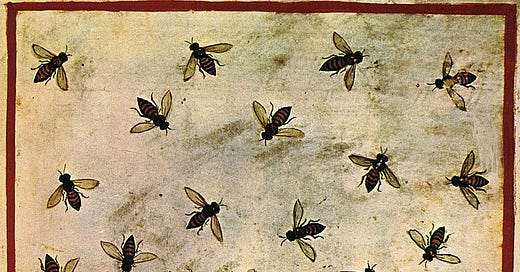Dear Friends,
I don’t remember how I learned about the Bee-judgements.
An Bechbretha in the original Irish, these rules date back to the 7th century and regulate the place of bees in the marketplace. If you owned a hive or a swarm and a neighbor caused them harm, or if you stumbled upon a previously unknown hive on someone else’s property, the Bee-judgements would tell you how this was to be dealt with. In some ways the text is not unlike some of the agricultural rules about gleaning found in the Bible.
Of course, it’s January in New England and a storm just blew through; the next few nights are expected to be some of the coldest temperatures we’ve seen in a while. There are no bees at large right now. So why bees?
I found myself thinking about bees in light of the St. John Chrysostom quote about their nature:
The bee is more honored than other animals not because she labors, but because she labors for others.
(Brick House in the City has a lovely graphic depiction of this quote here.)
It’s a fitting quote always, but particularly for this moment, I think, and in keeping with this week’s Epistle – from Paul’s first letter to the Corinthians. He reminds us there that “as it is, God arranged the members in the body, each one of them, as he chose. If all were a single member, where would the body be? As it is, there are many members, yet one body. The eye cannot say to the hand, "I have no need of you," nor again the head to the feet, "I have no need of you."… But God has so arranged the body, giving the greater honor to the inferior member, that there may be no dissension within the body, but the members may have the same care for one another. If one member suffers, all suffer together with it; if one member is honored, all rejoice together with it.”
Whether we are one body or one hive, let us be of service to one another – those of us of all ages and abilities – rejoicing in that unity and mourning together, in turn, as it is called for. When we want to lose hope, may we remember the bees.
Beeswax, Candles, & The Coming Light
It may not feel like it, but the days are getting longer. Candlemas – February 2 – also known as the Feast of the Presentation, approaches, signaling the coming Spring. (I’ve written a bit about Candlemas before.) Candlemas may not be about bees, but they do play a special role in this festival, which is often marked by eating honey and blessing beeswax candles.
You may not have caught it in the midst of the chanting, but if you’ve heard the Exsultet at the Easter Vigil, the bees feature there as well, and are, once again in their diligence, compared to the Mother Mary. But let us stay at Candlemas.
There may not be any bees flitting about on Candlemas, we are given a springtime rhyme: “If Candlemas Day be fair and bright, winter will have another fight. If Candlemas Day brings cloud and rain, winter won't come again”
As I think about Candlemas in my own context, I am thinking about its intersection with the ministry of the Altar Guild. Certainly all ministry groups labor for others, but there is something unique about the invisible yet essential work of the Altar Guild. Much like bees that in weeks past pollinated a flower that only much later bears fruit, Altar Guilds are often familiar with the sort of essential particulars that make our devotional lives run. How do we recognize these most unseen labors – in our churches and our communities? How might we bless the candles that can shed light upon them?
Resource Round-Up
Have you seen the Little Box of Good News launch out of the Diocese of Louisiana? I’ve been excited about this program since the grant was first announced and the materials look great!
I’m a big puzzle nerd, so it’s not surprise that I love this St. Valentine puzzle from Catholic Family Crate.
I’ve been thinking a lot about Breath Prayer. I like these two very different takes - some science about the practice from BioLogos and this simple, personal take on praying continually from CT.
With apologies to my handful of non-US readers, we’re in the thick of it right now. We’re also still early in a long Epiphany.
Let’s take a deep breath, inhaling connection and exhaling isolation.
Inhaling hope and exhaling despair.
Listen for the bees. They’ll return sooner than we know.
Peace,
Bird




